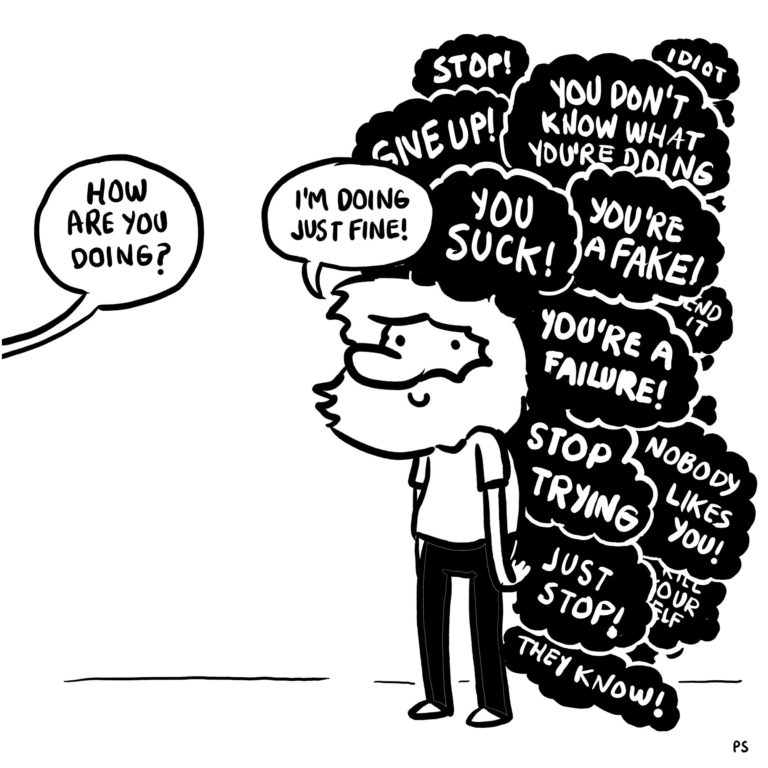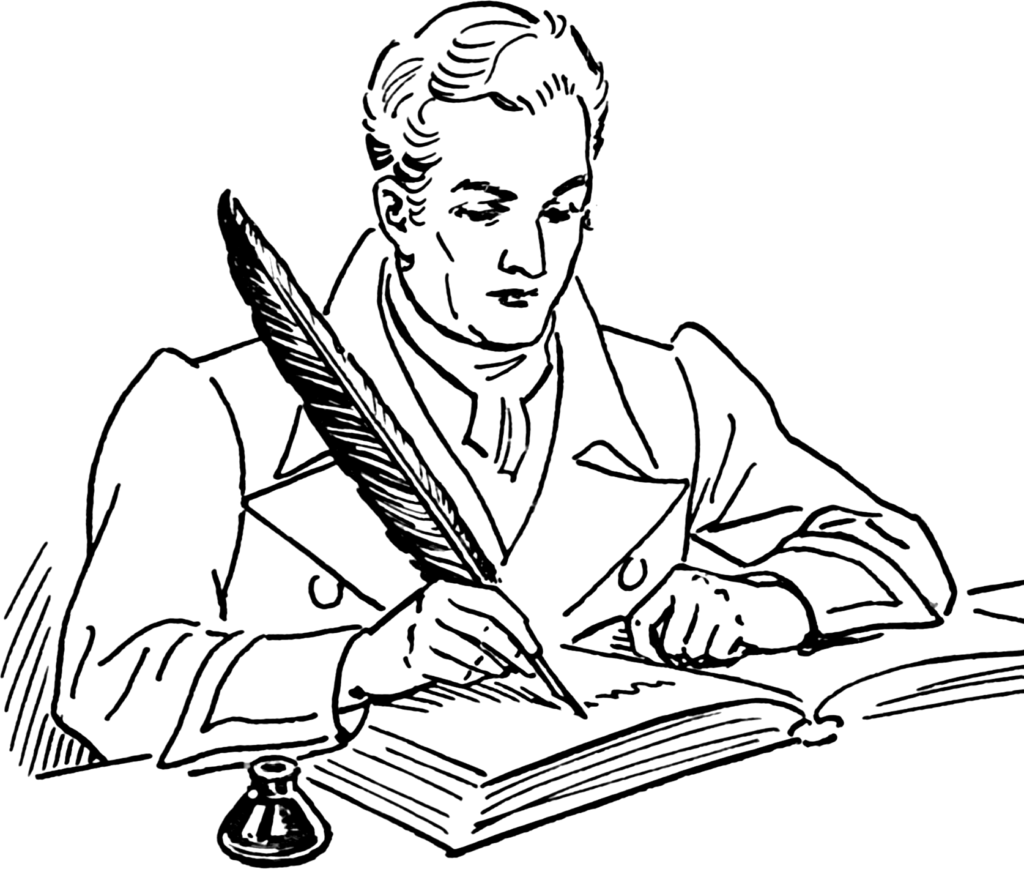The scariest bit about being a writer – for me at least – is the neuroses it brings out in me.
So, here it is, the dirty truth laid bare…
I don’t believe I’m very good at anything. Truly, I don’t.
I have a deep-rooted envy of people who brim with self-confidence. The kind of people who breeze confidently into any situation, and effortlessly glide right through knowing that what they are doing is right. That what they are doing is good.
That’s not me. It never has been.
The official term is ‘Imposter Syndrome’. Here’s the Google definition…
‘Imposter syndrome can be defined as a collection of feelings of inadequacy that persist despite evident success. ‘Imposters’ suffer from chronic self-doubt and a sense of intellectual fraudulence that override any feelings of success or external proof of their competence.’
Or for those of you who prefer a good cartoon…

Yup. That about sums it up.
I’ve felt this way for as long as I can remember, about pretty much every phase of my life. But my writing…well, that’s where things get really bad!
The Imposter Author

So, am I a writer?
Or am I an Author?
That’s the crux of the issue, isn’t it?
Where is the distinction? If indeed there is one.
My website – the one you’re looking at now – is called ‘JonFordAuthor.com’. The word author is plastered all over it. Technically (and according to my wife and friends!) it’s true. I’ve written books, therefore, ergo, vis-à-vis… I’m an Author!

So, why doesn’t it feel that way?
I know why. Because that title hasn’t been validated by getting an agent to represent me. Or getting a publishing deal. Or seeing my book in paperback or hardback on a shelf somewhere. Or even electronically available somewhere.
I’m not a published author, and in my head the two are intertwined.

And this gets worse when I look around the #WritingCommunity on Twitter, and see literally hundreds of other writers in the same boat. Many of them struggling and striving to find that deal. That perfect agent who will love, respect and represent their hard work.
So, I talk to as many of them as I can. I enquire about their books and ideas…usually finding out that they’re so much cooler than mine! Some even share examples with me, leaving me envious of their skills. It feels like I’m a tiny fish swimming around in a huge barrel.
Yet I have no concept truly of where I am in that barrel. Am I at the bottom? Or near the top?
Now this is where it gets REALLY silly!
I have friends and peers that say:
“Nonsense, Jon, your stuff is really good! Makes me feel like an amateur! Makes me feel intimidated!”
Which, the part of my brain wired with Imposter Syndrome KNOWS is bullshit! (Still, a little teeny part of me is flattered nonetheless! Lol)
So, I’ll respond with:
“Don’t be a muppet! Your stuff is every bit as good as mine! Nay, tis BETTER than any of my mere childish scribbles!!”
And suddenly I realize I’m not alone! Imposter Syndrome is a rampant and highly contagious disease!

Also…we’re both being huge fucking hypocrites! *shrugs*
The Truth…
…lies somewhere in between all the neuroses.
In actual fact, both of our writing is very likely good. There will, of course, be people who are worse writers, and there will be people that are better. That’s the nature of things. Everyone sits somewhere in the middle of the scale, only the outliers live at either end, and I am NOT cocky enough to believe I’m one of the outliers at the top…
…conversely, I’m not as unconfident in my own skills to believe I’m at the bottom either! A man’s got to have SOME self esteem after all!
So, in fishy terms, we’re swimming around the middle of that metaphorical barrel.
The bigger problem is how the process of moving from having your draft manuscript to getting it on a bookshelf in Waterstones (or Barnes & Noble, if you’re Stateside!) is almost custom made to make you feel bad about your work.
- Your manuscript is not ready yet and needs editing…so you work diligently on never knowing if it’s good or not!
- So, you get beta-readers…who will then feed back on your work. Hopefully it’s good feedback, but sometimes it might not be!
- Or are your beta-readers all friends, family…people who would just tell you it’s good? Can you trust these people to tell you if you’re an terrible scribe?
- And then we come to the point I’m at now…
‘Jon Ford is seeking representation‘…
The Querying Process
There’s a review on Amazon – for the Writers and Artists Yearbook 2020 – that made me laugh

It’s funny because it seems so true.
This week I entered the murky, shark-infested waters of querying. And it’s terrifying me. Because this is the first time my manuscript is going before a totally unrelated, unknown entity for any form of critique.
Rejection is coming…and I KNOW it’s going to really hurt!

It’s not even an easy process to get into. First you’ve got to FIND the Agents. Then you’ve got to find their submission criteria, which is ALWAYS annoyingly similar but NEVER quite the same! Then you’ve got to craft your query letter, your synopsis (which for my book was a bitch, I can tell you!) and then sort out however much of your manuscript they want to see (10 pages, 50 pages, 3 chapters, 5 chapters…).
It’s not even easy deciding what your ‘Subject line’ is supposed to be!
Maybe… it’s just me.
- Is it just me that finds all this process bewildering?
- Is it just me that sometimes feels on the verge of being utterly demoralized by the process?
- Is it just me that finds all this a struggle?
I don’t think it is. I get a lot of feedback from other writers in the same boat who have the same fears and problems that I have. I’m sure the information is out there. I’m positive I’m just missing it and stumbling around in the dark when there are probably loads of people who would hand me a torch if I just knew who to ask.
So, what I plan to do is put the results of my querying here on my blog. I may even throw up a page specifically for it, tracking my progress. Mostly I’ll do it in the hope that anyone else reading this might feel a little bit better about any smidgen of ‘Imposter Syndrome‘ they themselves might be feeling!
Love & Books


B.J. Frazier
Jon Ford
Mason
Martin
Jim
Jim
Mason
Jon Ford
ShelbiI
Jon Ford
Sean
Melina
Jon Ford
Sean
Simon
Jon Ford
Simon
Robert